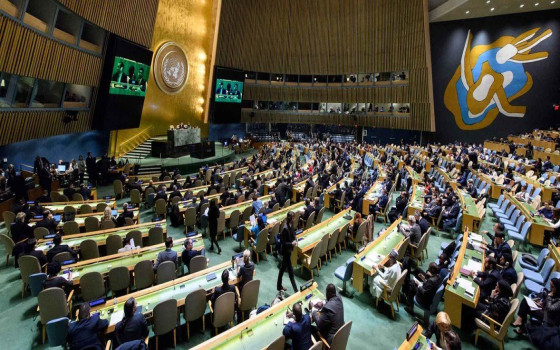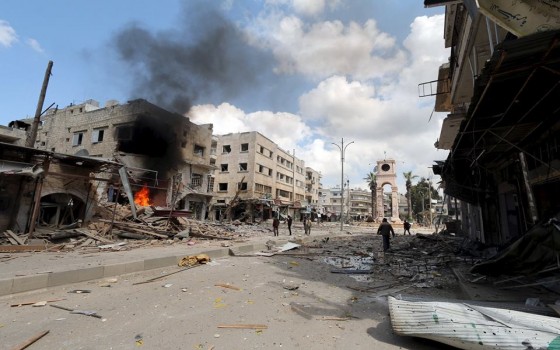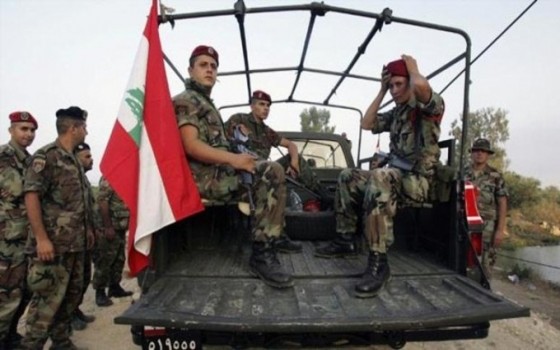
The United Nations calls for an end to communication via missiles and drones.. Calling on the international community to prevent the Middle East from being pushed to the brink of the abyss.. and a UN official visits UNIFIL forces today

- Europe and Arabs
- Thursday , 1 August 2024 6:3 AM GMT
Capitals: Europe and the Arabs
The Under-Secretary-General for Political Affairs of the United Nations, Rosemary DiCarlo, said that the various attacks over the past few days in the Middle East represent a dangerous escalation, calling for "an end to communication through missiles, armed drones and other deadly attacks." According to the UN daily news bulletin.
In her briefing before an emergency session of the Security Council, held yesterday evening, Wednesday, to discuss the situation in the Middle East, including the Palestinian issue, she referred to the news that Ismail Haniyeh, head of the political bureau of Hamas, was killed with a bodyguard in Tehran, which she said "comes in the wake of several recent escalating events in the region. While violence continues unabated in Gaza after months of continuous diplomatic efforts, the situation across the Blue Line and inside Lebanon is on an increasingly worrying path." She also referred to what the Israeli forces said about carrying out a strike in Beirut against a Hezbollah leader, as well as the killing of 12 children and the wounding of dozens in an attack on a football stadium in the Druze village of Majdal Shams in the occupied Golan.
DiCarlo added that these attacks come in the midst of the ongoing war in Gaza, where Hamas continues to hold hostages it abducted from Israel on October 7, amidst the ongoing hostilities and the catastrophic humanitarian situation of the Palestinian population in the Strip.
The UN official stressed the "urgent need for diplomatic efforts to change the course and seek regional peace and stability." She reiterated the UN Secretary-General's call for all to work vigorously towards regional de-escalation for the benefit of long-term peace and stability for all.
DiCarlo said: "The international community must work together to prevent any actions that would make the conflict larger and more widespread very quickly." She stressed the need for rapid and effective diplomatic action to de-escalate the region, in which the Council plays a crucial role.
For his part, the Secretary-General of the United Nations, Antonio Guterres, expressed his belief that the attacks we witnessed in southern Beirut and Tehran represent a dangerous escalation, at a time when all efforts should lead, he said, to a ceasefire in Gaza, the release of all Israeli hostages, a massive increase in humanitarian assistance to the Palestinians in Gaza, and the return of calm in Lebanon and across the Blue Line.
But instead, according to the Secretary-General, what we see are efforts to undermine these goals.
The Secretary-General said - in a statement attributed to his spokesman, Stephane Dujarric - that he has consistently called for maximum restraint by all. "However, it is increasingly clear that restraint alone is not enough at this very sensitive time."
The Secretary-General urged everyone to work, vigorously, for regional calm for the sake of long-term peace and stability for all.
The Secretary-General said that the international community must work together to prevent any actions that would push the entire Middle East to the brink of the abyss, with a devastating impact on civilians, noting that advancing comprehensive diplomatic action is the means to do so for regional calm.
UN Ready to Support Diplomatic Efforts
In turn, the UN Special Coordinator for the Middle East Peace Process, Tor Wennesland, expressed deep concern over recent developments in the Middle East, which he said could have far-reaching repercussions for the region.
He urged restraint and avoidance of actions that could further destabilize the region.
Tor Wennesland said in a post on the X website that he is in contact with all relevant parties to work to calm tensions.
On the other hand, the Under-Secretary-General for Peacekeeping Operations, Jean-Pierre Lacroix, continues his visit to Lebanon this week as part of a broader tour of the Middle East.
UN Spokesperson Stephane Dujarric said at the daily press briefing at UN Headquarters in New York on Wednesday that Lacroix held meetings with senior government and military officials in Beirut, including Parliament Speaker Nabih Berri and Prime Minister Najib Mikati.
He added that the discussions focused on the current situation in southern Lebanon, across the Blue Line separating Lebanon and Israel, and the important work being done by the United Nations Interim Force in Lebanon (UNIFIL).
Dujarric said that the UN official will head to the Naqoura area on Thursday to visit the UNIFIL headquarters and meet with peacekeepers who are currently conducting active patrols along the Blue Line.












No Comments Found